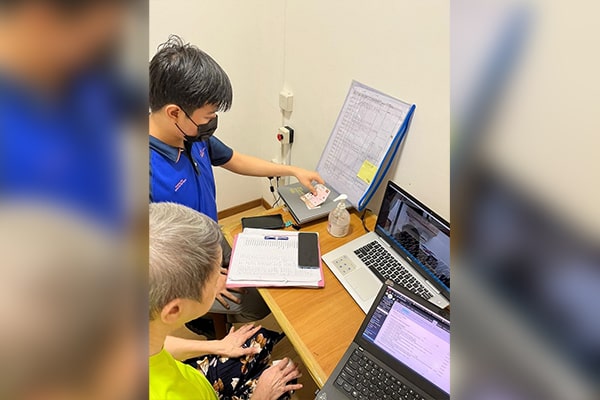By Tan Tock Seng Hospital with National Healthcare Group Polyclinics and Geylang East Home for the Aged
Attending medical appointments regularly is crucial in helping seniors manage their conditions and keep healthy and well in the community, but less-mobile seniors often face challenges in keeping to their appointments as they require more logistical support to get to the clinic. Technology-led solutions like teleconsultations are also out of their reach as they lack the relevant resources and knowledge.
In a collaborative effort between Tan Tock Seng Hospital (TTSH), Geylang Polyclinic and Geylang East Home for the Aged (GEHA), residents of the Home are now able to follow up more regularly with their doctors through assisted teleconsultations.
During case discussions with GEHA, the TTSH Community Health Team (CHT) came to learn that the Home has one nursing aide to accompany residents to their polyclinic appointments, which naturally posed manpower and scheduling conflicts. The CHT thus linked GEHA and Geylang Polyclinic up to share data on residents with upcoming appointments, with the residents’ consent. With this information, the polyclinic doctors would then assess the suitability of converting their appointments to teleconsultations. To date, most of the seniors residents assessed have been found to be suitable.
During their appointment slots, seniors residents were able to go for their teleconsultation sessions in a room within the Home itself. To ensure a more fruitful consultation session, the CHT nurse would check in with each senior resident on their concerns before the appointment, and assist the GEHA nursing aide in providing the required information to the polyclinic doctor.
Besides the tangible cost savings in terms of transport, convenience and time, teleconsultations are more comfortable for residents as sessions take place in a familiar environment. It also promotes safe distancing and reduces crowds in healthcare institutions in the face of the COVID-19 pandemic.
Polyclinic doctors also reflected that such teleconsultations allow them to better assess the residents’ living environment and factors that may affect their health conditions., and the better The increased patient adherence to appointments also allows for better continuity of care.
The collaboration has served to lower barriers for nursing home and community residents to see their doctors, and for polyclinics and community partners to work in unity. In the long term, such collaborations aim to promote health equity in an increasingly technology-reliant world and connect residents to the wide range of services and activities by governmental agencies and community partners, in line with the national Healthier SG initiative.
 Staff from Geylang East Home for the Aged preparing the teleconsultation session for a resident.
Staff from Geylang East Home for the Aged preparing the teleconsultation session for a resident.
Find related items:
Issue 17: November 2022